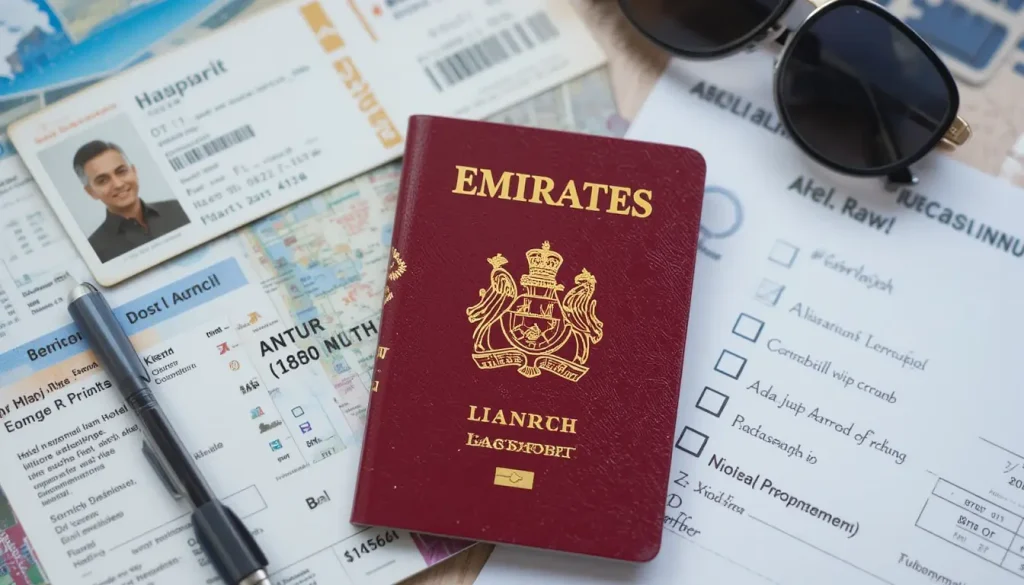Planning a trip to Mali should be exciting—but for many UAE residents, the visa process feels overwhelming. Confusing requirements, outdated online information, and the fear of rejection often create unnecessary stress, especially for those balancing demanding work and family schedules.
Now, imagine a different experience: a clear, straightforward process where every requirement is explained, every form is correctly filled, and your chances of approval are maximized. Instead of worrying about paperwork, you can focus on preparing for your journey and looking forward to exploring Mali’s cultural richness and natural beauty.
This guide is designed to be your bridge from confusion to confidence. We provide accurate, up-to-date information on Mali’s tourist visa requirements for UAE residents, along with step-by-step instructions and expert insights. And if you’d prefer professional support, our dedicated application service is here to handle the details on your behalf—saving you time and ensuring peace of mind.
Discovering Mali: A Gem in West Africa & Visa Overview
Mali is a destination that blends history, culture, and natural beauty into a truly unforgettable experience. Known as the gateway to legendary Timbuktu, Mali is home to ancient mosques, traditional mud-brick architecture, and centuries-old manuscripts that reflect its deep scholarly heritage. Beyond its historic cities, the breathtaking landscapes of Dogon Country, the Niger River, and vibrant local markets offer travelers a unique window into West Africa’s soul.
For UAE residents seeking a journey that combines cultural immersion with adventure, Mali stands out as an exceptional choice.
Visa Overview for UAE Residents
To enter Mali for tourism, UAE residents both expatriates and Emirati nationals are generally required to obtain a tourist visa before travel. Applying from within the UAE ensures that your application is processed under the jurisdiction of the Malian Embassy or consular services responsible for the region, minimizing delays and confusion.
All details provided in this guide are based on the latest available guidelines from official embassy sources. However, because visa regulations are subject to change, we recommend verifying requirements with the Malian Embassy in Abu Dhabi or through a trusted application service before applying.
Understanding Mali Visa Categories (Focus on Tourist Visa)
Tourist Visa
The tourist visa is the most common and suitable option for leisure travelers. It allows visitors to explore Mali’s attractions, attend cultural events, or visit friends and family. Key points include:
- Purpose: Tourism, sightseeing, and family visits.
- Duration: Typically issued for short stays (often up to 30 or 90 days, depending on embassy discretion).
- Entries: Options may include single-entry or multiple-entry visas, depending on your travel needs.
Other Visa Categories (Brief Overview)
While this guide focuses on tourist visas, it is useful to be aware of other categories to avoid confusion:
- Business Visa: For attending meetings, conferences, or conducting short-term business.
- Transit Visa: Required if you are passing through Mali en route to another destination.
- Diplomatic/Official Visas: For government officials or those traveling on official duty.
Key Takeaway: Always choose the visa category that matches your true travel intent. Applying under the wrong category may lead to delays, rejection, or difficulties during your trip.
Note: If your purpose is business, employment, or official duty, you must apply under the correct visa category instead.
4. Financial Solvency
Applicants must demonstrate the ability to fund their trip. This usually includes:
- Recent bank statements (last 3–6 months)
- Evidence of employment or a sponsor letter (if applicable)
5. Return/Onward Travel
A confirmed return or onward ticket is mandatory. This reassures immigration authorities that you intend to leave Mali at the end of your stay.
Interactive Visa Eligibility Quiz
Answer a few quick questions to check if you’re eligible for a Mali Tourist Visa as a UAE resident.
Mandatory Documents Checklist for Mali Tourist Visa
A well-prepared application starts with a complete and accurate set of documents. Missing, expired, or inconsistent paperwork is one of the most common reasons for visa delays or rejections. Use this detailed checklist to ensure you meet every requirement with confidence.
| Document | Description/Requirements | Purpose |
| Original Passport | Valid for at least six (6) months beyond your intended stay in Mali; minimum of two (2) blank pages for visa stamps. | Primary travel document and proof of identity. |
| UAE Residence Visa Copy | Clear copy of valid UAE residence visa and Emirates ID. Residency should be valid for at least three (3) months beyond your return date. | Proof of legal residency in the UAE. |
| Visa Application Form | Completed and signed form, obtainable from the Mali Embassy/Consulate or your visa service provider. All details must match your passport and supporting documents. | Official visa request providing your personal and travel information. |
| Passport-Sized Photos | Two (2) recent color photos (3.5cm x 4.5cm, white background). Neutral expression, no head coverings unless for religious reasons. | For identification and attachment to visa form. |
| Flight Itinerary/Booking | Confirmed round-trip flight booking with clear entry and exit dates. | Demonstrates your planned travel schedule and intention to leave Mali. |
| Hotel Reservation | Confirmed booking covering your stay in Mali. If staying with friends/family, provide an invitation letter plus host’s ID/passport and proof of residence. | Proof of accommodation arrangements. |
| Bank Statements | Original, stamped bank statements for the last 3–6 months, showing sufficient funds. | Proof of financial capability to cover your stay. |
| No Objection Certificate (NOC) | Employer-issued letter confirming your position, salary, and leave approval. Business owners must provide a trade license copy. Students require a letter from their institution. | Confirms your status in the UAE and assurance of return. |
| Travel Insurance | Comprehensive policy covering medical emergencies, repatriation, and trip cancellation. Ensure coverage spans your entire stay. | Financial protection against unforeseen events. |
| Invitation Letter (if applicable) | From a host in Mali, including contact details, address, and copy of their Malian ID/passport. | Verifies visit purpose and provides host’s information. |
| Yellow Fever Vaccination Certificate | Mandatory for all travelers entering Mali. | Compliance with Mali’s health and entry requirements. |
Expert Tip
Double-Check All Documents: Ensure your passport, photos, and supporting paperwork meet exact specifications. Even small discrepancies (like mismatched dates or expired documents) can lead to delays or rejection.

Differentiation Opportunity: Interactive Checklist
Consider an online interactive checklist where applicants can tick off items as they prepare them. Tooltips could provide extra guidance for example, reminding users of the required passport photo size or the minimum bank balance typically expected.
Product Recommendation
Digital Document Scanners (e.g., Adobe Scan, CamScanner): These tools help applicants quickly digitize, organize, and securely share documents with embassies or visa services.
Step-by-Step Mali Tourist Visa Application Process for UAE Residents
Applying for a Mali tourist visa from the UAE can be simple when approached with a clear roadmap. Follow these steps carefully to ensure a smooth and successful application:
| Step No. | Action Required | Purpose |
| 1. Research & Preparation | Visit the Mali Embassy in Abu Dhabi website or consult a trusted visa service for the latest forms and requirements. Expert Tip: Start Early initiate the process at least 4–6 weeks before your trip. | Ensures accurate, updated information and sufficient time for processing. |
| 2. Document Collection | Assemble all documents from the mandatory checklist (passport, UAE residence visa, photos, itinerary, bank statements, etc.). Ensure they are current, consistent, and complete. | Avoids delays or rejections due to missing or invalid paperwork. |
| 3. Prepare for Submission | Double-check forms and supporting documents. Expert Tip: Keep Copies retain duplicates of everything you submit. E-E-A-T Consideration: Ensure all information is consistent across documents. | Safeguards against loss and builds credibility with the embassy. |
| 4. Application Submission | Submit your application in person at the Mali Embassy in Abu Dhabi (as Mali does not currently have a consulate in Dubai). If you cannot visit directly, use a reputable visa service provider that liaises with the embassy. | Official step to initiate visa review. |
| 5. Pay Visa Fees | Pay the required visa fees at submission (payment options may include cash, card, or bank transfer, depending on embassy rules). Expert Tip: Always request a receipt. | Confirms processing of your application. |
| 6. Interview (If Required) | Though not common for tourist visas, some applicants may be asked to attend a short interview at the embassy. Expert Tip: Be ready to clearly explain your travel purpose, itinerary, and proof of return. | Provides embassy officers with clarification if needed. |
| 7. Visa Processing | Embassy staff review and verify your application. Processing times typically range from 5–15 working days, but may vary. | Period of official evaluation. |
| 8. Visa Collection | Once approved, collect your passport with the visa affixed from the Mali Embassy in Abu Dhabi or through your chosen visa service provider. | Final authorization to travel to Mali. |
Differentiation Opportunity: Visual Process Flowchart
To make this process easier, consider including a simple infographic or flowchart summarizing these 8 steps from preparation to collection so applicants can see the full journey at a glance.
What Happens Next? Post-Application Guide
The waiting period after submission can feel uncertain. Here’s what to expect and how to prepare:
1. Application Tracking
- Check updates via the Mali Embassy in Abu Dhabi (phone/email).
- If you applied through a visa service provider, many offer real-time tracking or status updates.
Differentiation Opportunity: If you provide services, highlight integrated tracking features that give applicants peace of mind.
2. Visa Approval & Passport Collection
- Collect your passport when notified.
- Expert Tip: Carefully review the visa stamp check the validity dates, number of entries, and permitted duration of stay.
3. Visa Rejection (What to Do)
If your application is unsuccessful:
- Review the rejection reason carefully.
- Correct any errors or missing documents before reapplying.
- Consider seeking expert visa assistance for your next submission.
4. Pre-Travel Checklist
Before departure, ensure:
- Flights and accommodation are reconfirmed.
- Travel insurance documents are printed and stored digitally.
- Currency exchange is arranged (West African CFA franc is the local currency).
- Packing essentials include your Yellow Fever vaccination certificate and sufficient medication.
Expert Tip: Know Local Customs familiarize yourself with Malian greetings, cultural etiquette, and dress norms to ensure a respectful and smooth experience.
Mali Tourist Visa Fees & Payment Methods
Transparency in fees helps applicants plan confidently and avoid surprises. Below is a breakdown of what UAE residents can expect when applying for a Mali tourist visa.

1. Embassy Visa Fee
- Tourist Visa (Single Entry): Typically ranges between AED XXX – AED XXX (subject to embassy updates).
- Tourist Visa (Multiple Entry): Generally higher than single entry, around AED XXX – AED XXX.
- Disclaimer: Fees are set by the Mali Embassy in Abu Dhabi and are subject to change without prior notice. Always confirm the latest fee schedule before applying.
2. Service Charges (if using an agency)
- Visa service providers may charge an additional AED XXX – AED XXX depending on the level of support (document review, application submission, pickup/drop-off).
- E-E-A-T Consideration: Reputable services clearly outline what their fees include (e.g., document verification, courier handling) and what they do not cover (e.g., embassy fees).
3. Accepted Payment Methods
- At the Embassy: Payment is usually accepted in AED (cash) or bank transfer. Some embassies may accept card payments, but confirm in advance.
- Through Agencies: Most agencies allow credit/debit cards, cash, or secure online payment portals.
- Currency: Payments are typically collected in AED. If USD is required, your agency will notify you.
4. Refund Policy
- Visa fees are non-refundable, even in the case of rejection or withdrawal of application.
- Service fees may also be non-refundable, though some providers may offer partial refunds if services have not yet commenced.
Product Recommendation: Use trusted international money transfer services (like Wise, Western Union, or your bank’s online portal) if embassy fees must be paid in a foreign currency.
Processing Time & Expedited Options
Understanding timelines helps ensure stress-free travel planning.
1. Standard Processing Time
- On average, Mali tourist visas for UAE residents are processed within 5–10 working days.
- Factors Influencing Timeframes:
- High application volumes (peak travel season).
- Incomplete or incorrect documentation.
- Embassy closures during UAE or Malian public holidays.
- High application volumes (peak travel season).
2. Expedited Services (If Available)
- The Mali Embassy in Abu Dhabi does not always offer expedited or same-day services for tourist visas.
- Some visa agencies may offer priority handling for an additional fee, though final approval speed depends on embassy discretion.
- Always confirm availability of express options before booking urgent travel.

3. Expert Tip
Start Early: Apply at least 3–4 weeks before travel. This buffer helps avoid last-minute stress if delays occur and is especially important during busy holiday periods or if no expedited services are offered.
Common Reasons for Visa Rejection & How to Prevent Them
One of the biggest worries for applicants is the possibility of rejection. Fortunately, most refusals result from avoidable mistakes. By being proactive and attentive, you can greatly improve your chances of success.
1. Incomplete or Incorrect Documents
- Problem: Missing forms, expired documents, or details that do not match across papers.
- Solution: Carefully cross-reference your application with the mandatory checklist. Double-check names, dates, and numbers.
- Expert Tip: ✅ Double-Check All Documents set aside time to review everything at least twice before submission.
2. Insufficient Funds
- Problem: Bank statements that don’t clearly show the ability to cover your trip expenses.
- Solution: Provide 3–6 months of stamped bank statements that demonstrate consistent financial stability. Include employer letters or sponsorship proof if necessary.
3. Discrepancies in Information
- Problem: Inconsistent details across the application form, passport, NOC, or hotel booking.
- Solution: Maintain absolute consistency ensure your personal details, travel dates, and purpose of visit align across all documents.
- Expert Tip: Be Transparent never attempt to conceal or alter information; honesty builds credibility with the embassy.
4. Unclear Travel Purpose
- Problem: Vague or unsupported reasons for travel may raise doubts.
- Solution: Provide a clear travel itinerary, confirmed flight bookings, and valid accommodation proof. If visiting family/friends, include a proper invitation letter.

5. Passport Validity Issues
- Problem: Passports not meeting minimum requirements (valid for less than six months).
- Solution: Renew your passport before applying if it does not have at least 6 months validity beyond your stay in Mali.
6. Previous Visa Violations
- Problem: Past overstays, illegal work, or immigration issues in Mali or other countries.
- Solution: Be upfront about previous issues. Provide supporting documents or explanations to demonstrate compliance moving forward.
7. Lack of Travel Insurance
- Problem: Applications without valid travel insurance may be rejected.
- Solution: Obtain comprehensive travel insurance covering medical emergencies, repatriation, and trip cancellations.
- Expert Tip: Consider Travel Insurance beyond being a requirement, it protects you against unforeseen travel risks.
Differentiation Opportunity: Common Pitfalls & Solutions
For maximum clarity, this section can be presented as a two-column visual guide (e.g., Problem → Solution), making it easy for applicants to spot and address potential issues.
Frequently Asked Questions (FAQs) about Mali Tourist Visa for UAE Residents
Q1: Do all UAE residents need a visa for Mali?
A: Yes. Almost all UAE residents require a visa to enter Mali, regardless of nationality, unless specifically exempt (which is rare). Always verify your nationality’s requirements with the Mali Embassy/Consulate before applying.
Q2: Can I apply for a Mali visa online?
A: Application forms can often be downloaded online, but physical submission at the Mali Embassy/Consulate (or through an accredited visa service provider) is generally required. Currently, Mali does not offer a full e-visa system for UAE residents.
Q3: What if my passport expires soon?
A: Your passport must be valid for at least six months beyond your intended stay in Mali. If your passport is due to expire sooner, renew it before starting your application.
Q4: Is Yellow Fever vaccination mandatory?
A: Yes. A Yellow Fever vaccination certificate is required for entry into Mali. You may be denied boarding or refused entry without it.
Q5: How long can I stay in Mali on a tourist visa?
A: Tourist visas typically allow a stay of 30 to 90 days, depending on your visa type (single or multiple entry). Always check the duration stamped on your visa.
Q6: What currency should I take to Mali?
A: The official currency is the West African CFA franc (XOF). While USD and Euros are often accepted for exchange or in major hotels, carrying local currency is essential for everyday expenses.
Important Travel Advisories & Health Information for Mali
Travel Safety & Security
- Stay updated with UAE government and Malian advisories.
- Exercise caution in certain regions due to security concerns avoid high-risk areas if advised.
- Keep emergency contacts handy:
- Local Police: 17
- Ambulance: 15
- Fire Brigade: 18
- UAE Embassy/Consulate (if available).
- Local Police: 17
Local Laws & Customs
- Dress modestly, especially in rural or religious areas.
- Always ask permission before photographing people.
- Drone usage is restricted check regulations before flying.
- Respect local traditions to avoid misunderstandings.
- Expert Tip: Know Local Customs a small effort in cultural respect goes a long way.
Health Precautions & Vaccinations
- Mandatory: Yellow Fever vaccination.
- Recommended: Hepatitis A & B, Typhoid, Tetanus, Meningitis.
- Malaria Prevention: Use prophylactic medication, insect repellent, and mosquito nets.
- Drink bottled or filtered water; avoid raw or undercooked food.
- Expert Tip: Research Health Requirements well in advance some vaccinations require multiple doses.
Consular Assistance
Contact your embassy or consulate in Mali for emergencies, lost passports, or legal issues. Register your travel if your home country offers this service.
💡 Product Recommendation: Secure comprehensive travel insurance (e.g., AXA, Allianz, or UAE-based providers) covering health, cancellations, and emergencies.
Our Mali Visa Services for UAE Residents
Applying for a Mali visa can feel overwhelming. Our expert team streamlines the process for UAE residents, reducing stress and maximizing approval chances.
Why Choose Our Service?
- 10 Years of hands-on experience with Malian visa applications.
- We handle the paperwork while you prepare for your trip.
- Minimize errors and avoid costly delays or rejections.
- Tailored guidance based on your nationality and circumstances.


